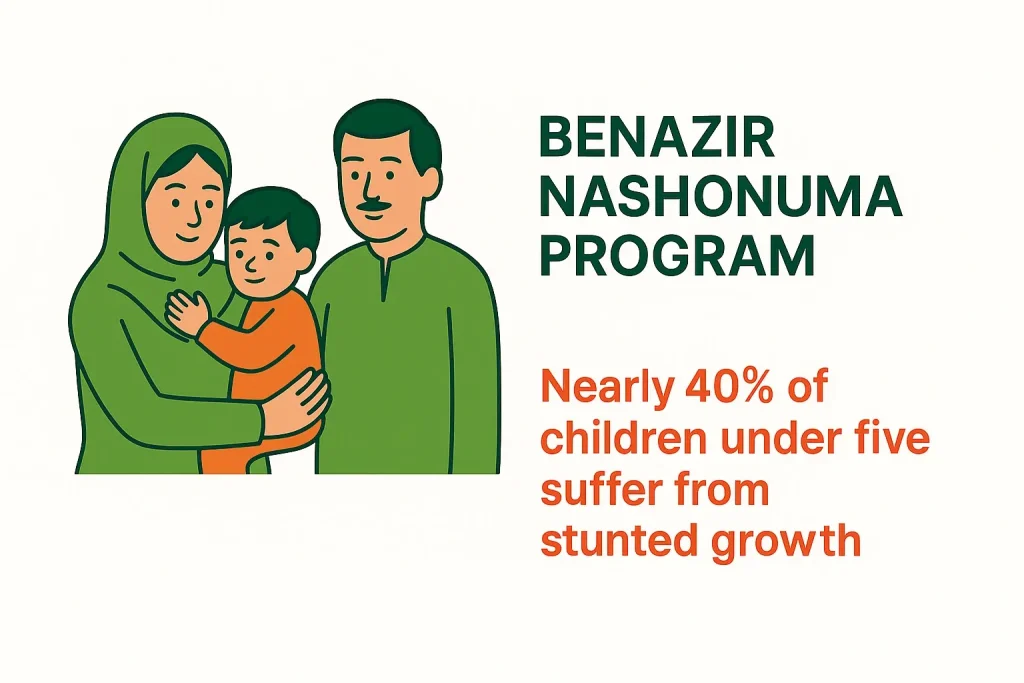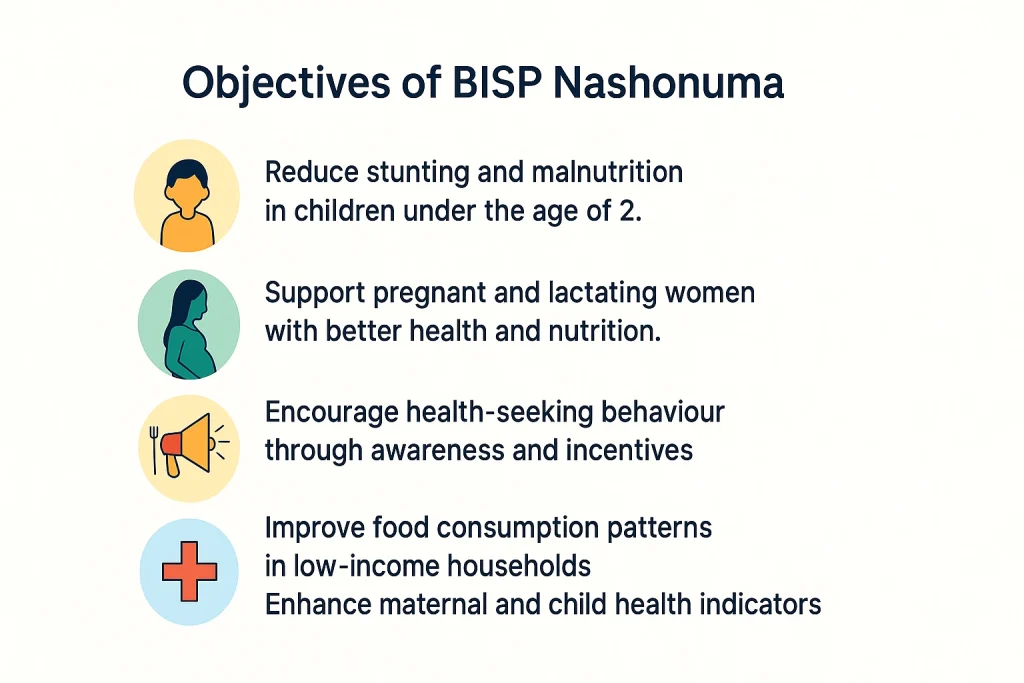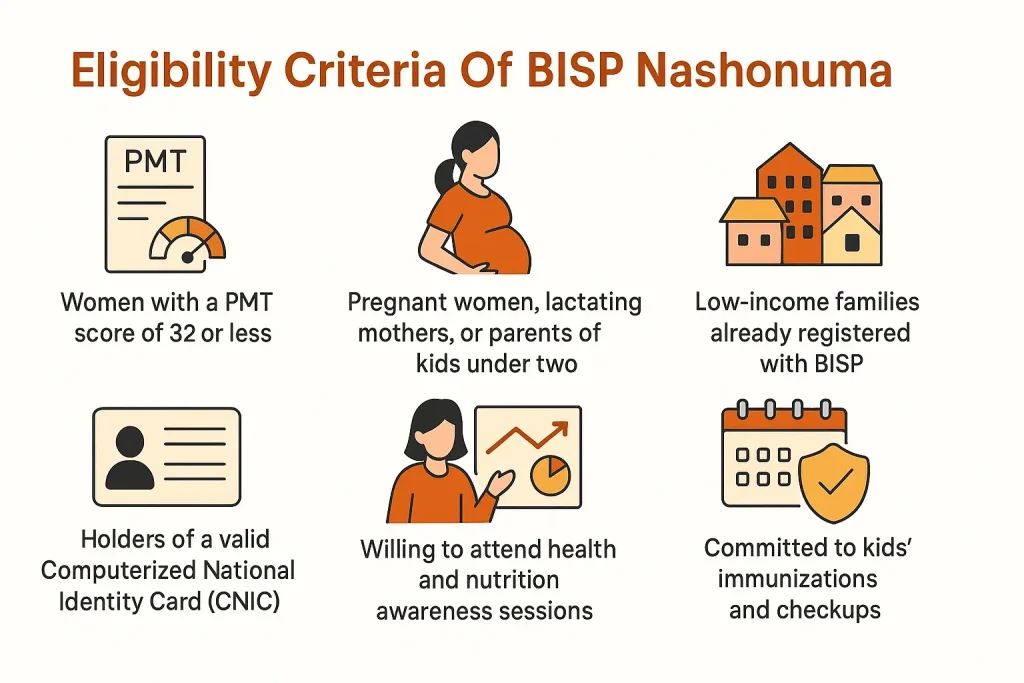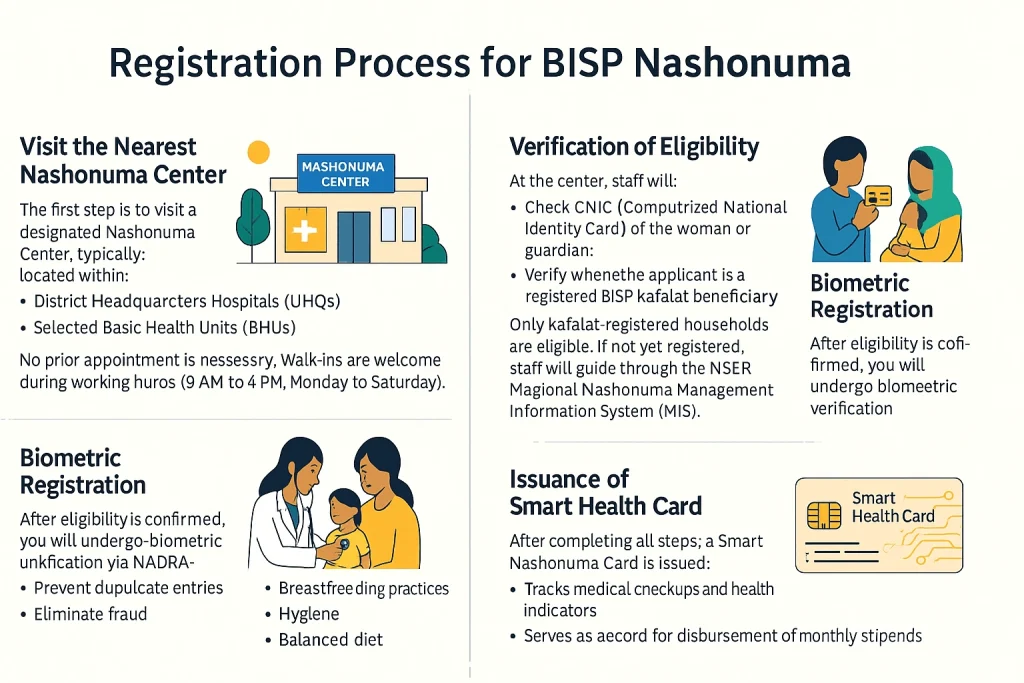Benazir Nashonuma
The Benazir Nashonuma Program is a special initiative under the BISP framework aimed at improving the health of pregnant women, new mothers, and children under the age of two. It provides monthly financial support, free nutrition supplements, and health education to reduce malnutrition and stunting in Pakistan’s most vulnerable families.
Malnutrition is a serious problem in Pakistan, affecting nearly 40% of children under five. Nashonuma was created to break this cycle and ensure a healthier future by supporting both mothers and their children during the most critical years of development.

بینظیر نشوونما پروگرام
Methods of Bisp Nashonuma Eligibility
To check your eligibility for the Nashonuma Program:
Offline VIA SMS
Send your CNIC number (without dashes) to 8171. You will receive a response indicating your eligibility status.
Online Via Website
Visit the 8171 Web Portal, enter your CNIC number, and follow the prompts to check your eligibility.
If your CNIC gets rejected, check out Reasons for CNIC Rejection by 8171 & Solutions.
Why Pakistan Needed Benazir Nashonuma
These aren’t just statistics—they’re red flags. Malnutrition in early childhood can hinder brain development, compromise the immune system, and limit a person’s potential for a fulfilling life. It’s a problem that doesn’t just affect individuals; it hinders the country’s overall progress.
Objectives of the BISP Nashonuma Program
The Benazir Nashonuma initiative is designed to:
- Reduce malnutrition and stunting in children under two years of age
- Improve the health and nutrition of pregnant and breastfeeding women
- Encourage regular health checkups, vaccinations, and nutrition counseling
- Provide food support and supplements to low-income families
- Promote healthier eating habits through education and awareness
- Strengthen maternal and child health outcomes across Pakistan

Eligibility Criteria Of BISP Nashonuma
Not everyone qualifies—here’s who’s eligible.

BISP Nashonuma Stipend Details
| Beneficiary | Monthly Stipend (PKR) | Support Type | Conditions for Receiving |
|---|---|---|---|
| Pregnant or Lactating Women | 2,000 | Conditional Cash Transfer | Must attend health checkups, counseling sessions, and nutrition programs. |
| Boy Child (Under 2 Years) | 2,500 | Conditional Cash Transfer | Must receive regular vaccinations and health checkups. |
| Girl Child (Under 2 Years) | 3,000 | Conditional Cash Transfer | Must receive regular vaccinations and health checkups. |
| Mother & Child | Free RUSF (food packets) | Ready-to-Use Supplementary Food (RUSF) | Distributed at centers to address malnutrition and micronutrient deficiencies. |
How Does BISP Nashonuma Work?
The program operates through dedicated Nashonuma Centers within district hospitals or rural health centres. Here’s how the support system works.
Conditional Cash Transfers
Stipends are given monthly to eligible women and children, based on health conditions:
- Attend regular health checkups
- Complete vaccinations
- Join counseling sessions on nutrition and hygiene
Monthly Stipend Breakdown
Rs. 2,000/month – Pregnant or Lactating Women
Rs. 3,000/month – Girl Child (Under 2)
Rs. 2,500/month – Boy Child (Under 2)
Note: All payments are conditional on health compliance.
Free Nutrition Support (RUSF)
Every month, families receive specially formulated food packets to fight malnutrition:
- Ready-to-use energy-dense food
- Micronutrient-rich supplements
- Tailored for mother and child health
Health Education & Counselling
Each visit includes free educational sessions on:
- Balanced diets and child feeding
- Breastfeeding practices
- Personal hygiene and sanitation
- Disease prevention strategies
This helps families adopt long-term healthy habits.
Registration Process for BISP Nashonuma
Visit the Nearest Nashonuma Center
Go to a nearby Nashonuma Center, typically located at:
- District Headquarters Hospitals (DHQs)
- Tehsil Headquarters Hospitals (THQs)
- Selected Basic Health Units (BHUs)
No appointment is required. Walk-ins are accepted from Monday to Saturday, 9 AM – 4 PM.
Bring Required Documents
Please bring the following original documents:
- CNIC (Computerized National Identity Card)
- Child’s B-Form (if born)
- Proof of BISP Kafalat registration (if available)
Verification of Eligibility
At the center, staff will:
- Check the CNIC of the mother or guardian
- Verify BISP Kafalat registration status
If not yet registered, you’ll be guided to complete your NSER Dynamic Survey first.
Biometric Verification
Biometric checks are performed using NADRA systems to:
- Prevent duplicate registrations
- Confirm the identity of the woman and child
- Store verified data in the Nashonuma MIS (Management Information System)
Health Screening & Counselling
Both mother and child will undergo basic health checks:
- Height and weight measurement
- Nutrition and vaccination review
- Anemia testing (in some locations)
Women also receive guidance on:
- Breastfeeding
- Personal hygiene
- Balanced diets
- Vaccination importance
Receive Your Smart Nashonuma Card
Once all steps are completed, you’ll be issued a Smart Health Card that:
- Tracks your checkups and eligibility status
- Is used to receive monthly cash support
- Allows withdrawal via HBL Konnect agents or ATMs
Tip: Keep SMS alerts and receipts safe for future visits.

Districts Covered Under BISP Nashonuma
Find out if Nashonuma is available in your local tehsil office.
Punjab
- Lahore
- Multan
- Bahawalpur
- Faisalabad
- Rawalpindi
- Dera Ghazi Khan
- Rajanpur
- Khanewal
- Rawalpindi
- Chakwal
- Attock
- Nankana Sahib
- Sheikhupura
- Gujrat
- Gujranwala
- Sialkot
- Sargodha
- Hafizabad
- Mandi Bahauddin
- Narowal
- Jhelum
Sindh
- Badin
- Karachi (East, West, Central)
- Sukkur
- Tharparkar
- Larkana
Balochistan
- Quetta
- Khuzdar
- Turbat
- Zhob
- Sibi
Khyber Pakhtunkhwa (KP)
- Peshawar
- Swat
- Bannu
- Kohat
- Charsadda
- Mansehra
Gilgit-Baltistan & Azad Jammu & Kashmir
- Skardu
- Gilgit
- Muzaffarabad
- Mirpur
- Ghizer
Frequently Asked Questions (FAQs)
Conclusion
BISP Nashonuma is more than just a nutrition program—it’s a lifeline for Pakistan’s next generation. Investing in mothers and children plants the seeds of a healthier, more innovative, and more resilient society.
With continued government support and community involvement, Benazir Nashonuma can genuinely transform Pakistan’s nutritional landscape.
